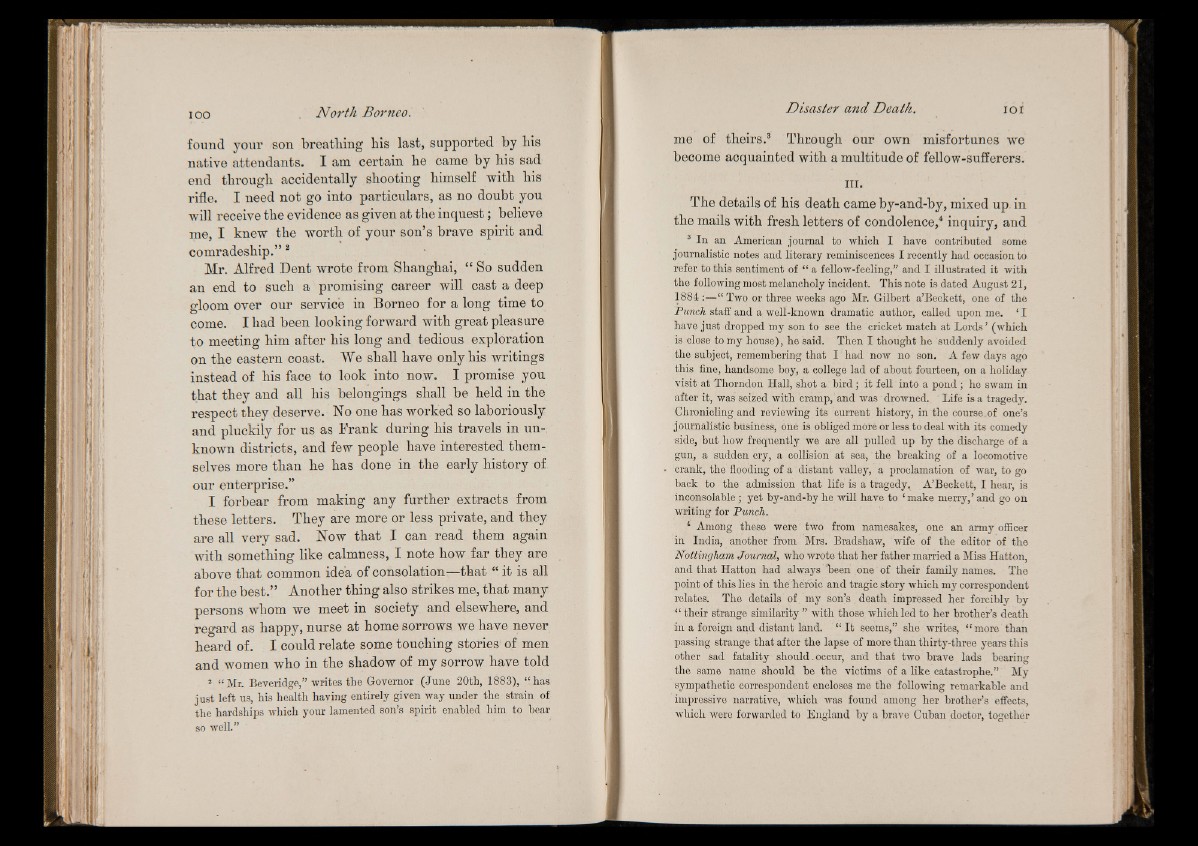
found your son breathing his last, supported by his
native attendants. I am certain he came by his sad
end through accidentally shooting himself with his
rifle. I need not go into particulars, as no doubt you
will receive the evidence as given at the inquest; believe
me, I knew the worth of your son’s brave spirit and
comradeship.” 2
Mr. Alfred Dent wrote from Shanghai, “ So sudden
an end to such a promising career will cast a deep
gloom over our service in Borneo for a long time to
come. I had been looking forward with great pleasure
to meeting him after his long and tedious exploration
on the eastern coast. We shall have only his writings
instead of his face to look into now. I promise you
that they and all his belongings shall be held in the
respect they deserve. No one has worked so laboriously
and pluckily for us as Frank during his travels in unknown
districts, and few people have interested themselves
more than he has done in the early history of
our enterprise.”
I forbear from making any further extracts from
these letters. They are more or less private, and they
are all very sad. Now that I can read them again
with something like calmness, I note how far they are
above that common idea of consolation—that “ it is all
for the best.” Another thing also strikes me, that many
persons whom we meet in society and elsewhere, and
regard as happy, nurse at home sorrows we have never
heard of. I could relate some touching stories of men
and women who in the shadow of my sorrow have told
* “ Mr. Beveridge,” writes the Governor (June 20th, 1883), “ has
just left us, his health having entirely given way under the strain of
the hardships which your lamented son’s spirit enabled him to bear
so welL"
me of theirs.3 Through our own misfortunes we
become acquainted with a multitude of fellow-sufferers.
h i .
The details of his death came by-and-by, mixed up. in
the mails with fresh letters of condolence,4 inquiry, and
3 In an American journal to which I have contributed some
journalistic notes and literary reminiscences I recently had occasion to
refer to this sentiment of “ a fellow-feeling,” and I illustrated it with
the following most melancholy incident. This note is dated August 21,
1884 :—“ Two or three weeks ago Mr. Gilbert a’Beckett, one of the
Punch staff and a well-known dramatic author, called upon me. ‘ I
have just dropped my son to see the cricket match at Lords’ (which
is close to my house), he said. Then I thought he suddenly avoided
the subject, remembering that I had now no son. A few days ago
this fine, handsome boy, a college lad of about fourteen, on a holiday
visit at Thorndon Hall, shot a bird; it fell into a pond ; he swam in
after it, was seized with cramp, and was drowned. Life is a tragedy.
Chronicling and reviewing its current history, in the course.of one’s
journalistic business, one is obliged more or less to deal with its comedy
side, but how frequently we are all pulled up by the discharge of a
gun, a sudden cry, a collision at sea, the breaking of a locomotive
crank, the flooding of a distant valley, a proclamation of war, to go
back to the admission that life is a tragedy, A’Beekett, I hear, is
inconsolable; yet by-and-by he will have to ‘make merry,’ and go on
writing for Punch.
4 Among these were two from namesakes, one an army officer
in India, another from Mrs. Bradshaw, wife of the editor of the
Nottingham Journal, who wrote that her father married a Miss Hatton,
and that Hatton had always Been one of their family names. The
point of this lies in the heroic and tragic story which my correspondent
relates. The details of my son’s death impressed her forcibly by
“ their strange similarity ” with those which led to her brother’s death
in a foreign and distant land. “ It seems,” she writes, “ more than
passing strange that after the lapse of more than thirty-three years this
other sad fatality should. occur, and that two brave lads bearing
the same name should be the victims of a like catastrophe.” My
sympathetic correspondent encloses me the following remarkable and
impressive narrative, which was found among her brother’s effects,
which were forwarded to England by a brave Cuban doctor, together